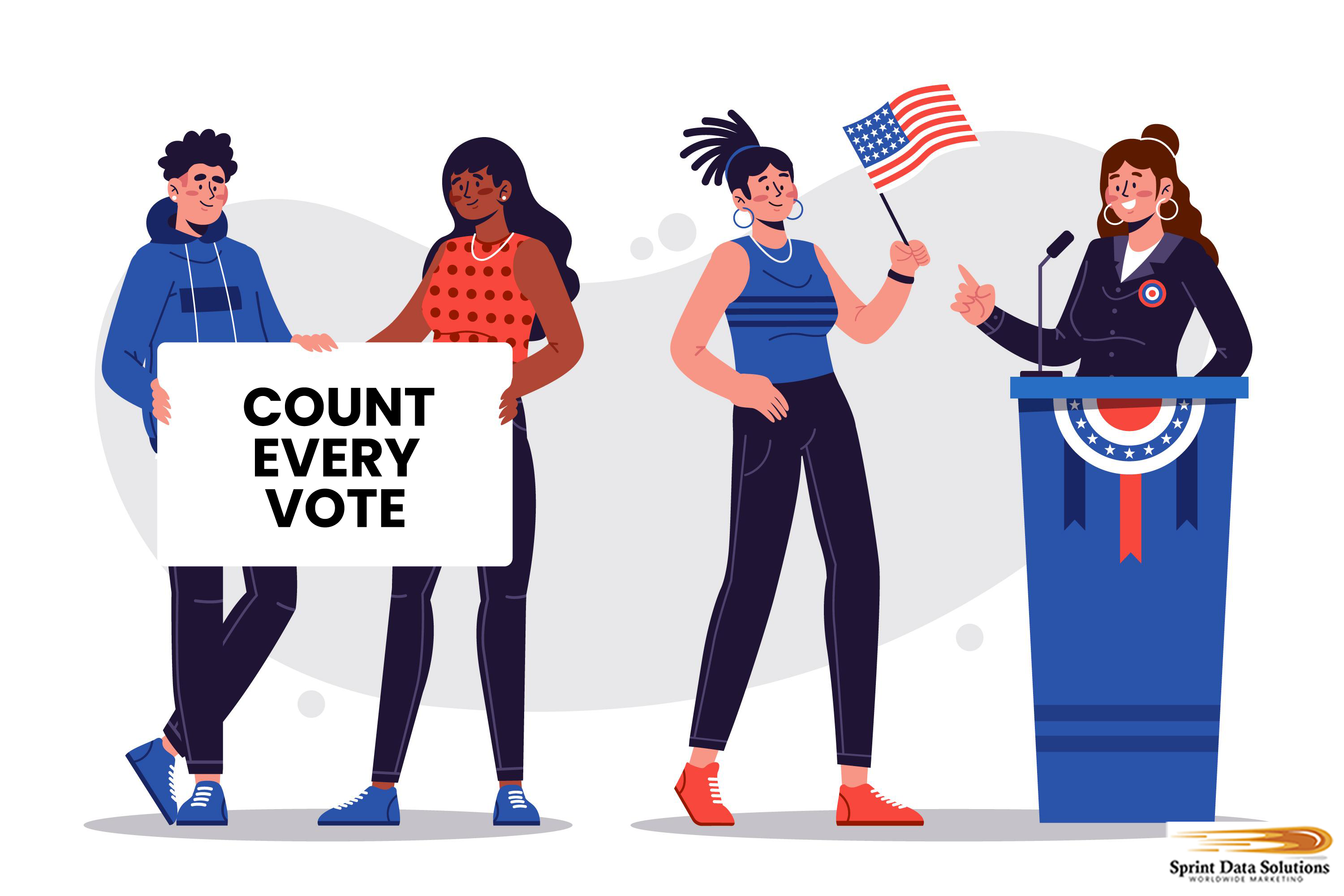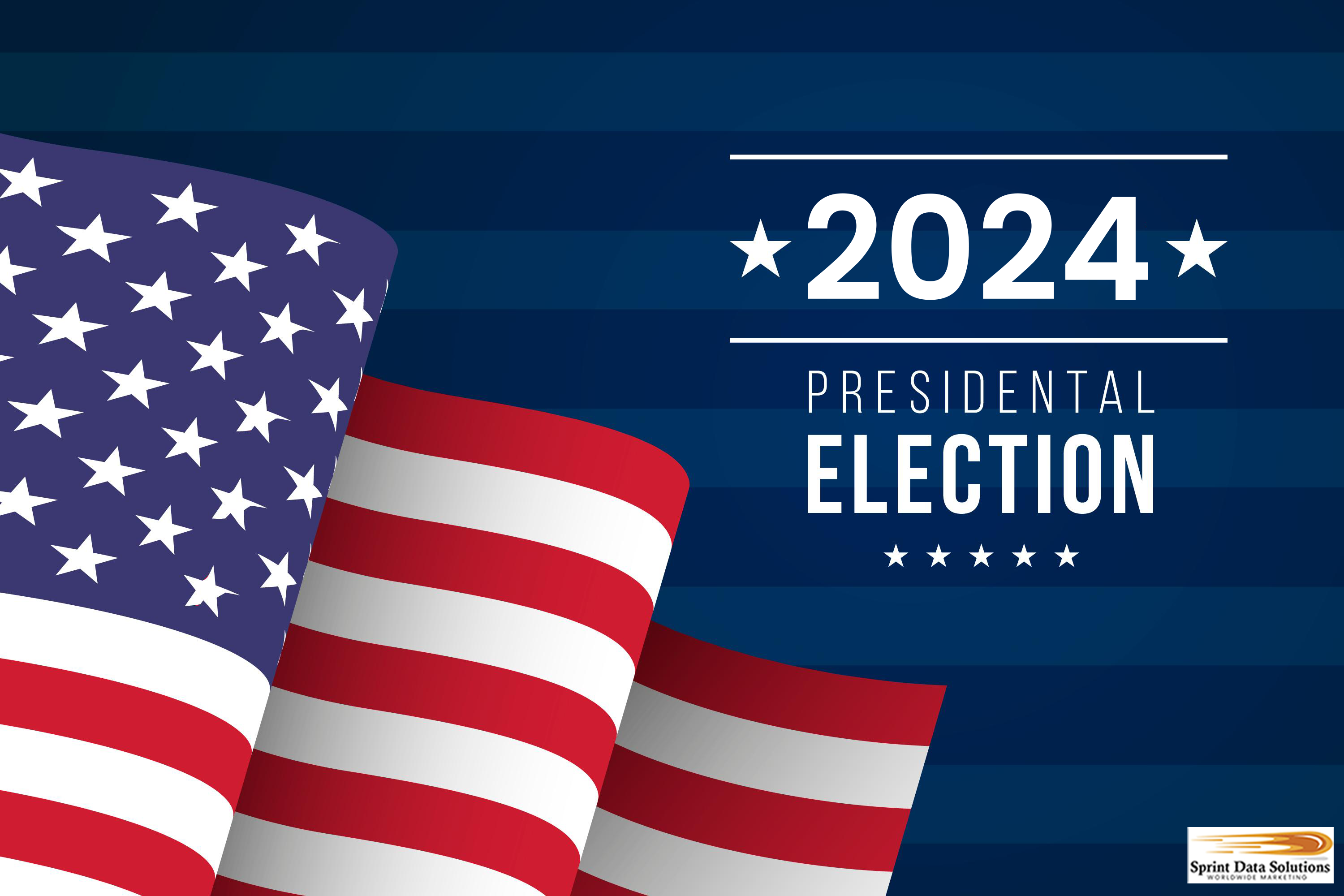Registered Voter Mailing List
The United States stands as one of the few countries in the world where democracy has been the cornerstone of governance since its very inception. This system of government empowers citizens to make decisions about their leadership by choosing individuals who will represent their interests at every level—from the local, county, and state levels, all the way up to the national stage. This democratic process, rooted in the will of the people, makes the U.S. unique among many nations, as it is one of the few places where the electorate has had the continuous right to choose their leaders throughout its history.
At the heart of this democracy is the election process, a critical and large-scale operation that brings together candidates, campaigns, and voters in a multifaceted effort to decide who will lead. During election periods, candidates promote their policies and values through campaigns, engaging with the public through speeches, debates, and advertisements, all aimed at convincing citizens of their vision for the future. This process culminates in the election itself, where citizens exercise their right to vote. The convenience of voting in the U.S. has significantly evolved, as citizens now have the option to cast their votes at designated polling locations or mail in their ballots, which has enhanced the accessibility of the voting process. This flexibility allows those who are physically unable to go to polling stations, whether due to mobility issues or other challenges, to still participate in the democratic process. It also accommodates individuals whose work schedules may not align with voting hours, ensuring that everyone has a chance to be heard without sacrificing their livelihoods.
Despite the importance of these electoral cycles, the democratic process is an ongoing effort. At any given time, while the nation may be between presidential elections, there are still numerous local, state, and county elections taking place, each of which plays a crucial role in shaping the governance of the country. In addition, the groundwork for the next presidential election is always underway, as political parties begin organizing and preparing their campaigns. The two major parties, alongside a growing number of independent candidates, begin to mobilize their supporters, launch campaigns, and set the stage for the larger electoral contest.
Sprint Data Solutions Worldwide Marketing has been an integral partner in supporting the machinery of democracy for many years, collaborating with political organizations to ensure that the election process remains efficient, effective, and accessible to all. As the country gears up for another election cycle, Sprint Data Solutions Worldwide Marketing is poised to once again lend its expertise and resources, helping to keep the democratic process running smoothly for the benefit of all voters. Their experience working with political campaigns ensures that they are ready to assist in every aspect of election-related efforts, from voter outreach to data management, ensuring the voice of the people is always heard loud and clear.
About Sprint Data Solutions Worldwide Marketing
Sprint Data Solutions Worldwide Marketing represents the culmination of a visionary journey led by a disabled veteran who, after years of honorable service defending the nation, sought a new path toward contributing to the economic growth of the United States. With a mission focused on empowering American businesses, the company was founded and continues to operate as a 100% American-based enterprise. Located in Las Vegas, Nevada, the company’s origins were humble, born out of the founder’s desire to create an impact in the post-military world. The goal was clear: to help businesses increase their revenues by expanding their customer base and improving their outreach efforts.
The initial years of Sprint Data Solutions were marked by a strategic approach centered around direct mail marketing—a service that was in high demand even before the widespread adoption of digital marketing. The direct mail efforts were critical in establishing the company’s core strengths in understanding and organizing vital customer data, including names, mailing addresses, and specific demographic information. These skills allowed the company to help clients target their marketing efforts with pinpoint accuracy, resulting in highly effective campaigns that generated strong returns. This commitment to quality and results earned Sprint Data Solutions a reputation for reliability and excellence, laying the groundwork for the company’s growth.
Over the years, the company’s success led to its expansion beyond the borders of Las Vegas. With each new success, the company grew its reach, initially covering the entire continental United States and later extending its operations to Alaska and Hawaii, ensuring that all U.S. markets were serviced. This growth spurred the company’s foray into international markets, with a significant expansion into North America, including Canada and Mexico. Not resting on its laurels, Sprint Data Solutions continued its ambitious journey, ultimately extending its services globally to reach the European Union, beginning with France.
Today, Sprint Data Solutions Worldwide Marketing is not just a company—it is a testament to resilience, strategic vision, and an unwavering commitment to driving business success through intelligent, data-driven marketing strategies. With a loyal staff boasting over 50 years of combined experience in marketing and promotions, Sprint Data Solutions continues to grow, adapt, and thrive as a trusted partner to businesses across the globe, empowering them to reach new heights and tap into new markets. Through decades of dedication, the company remains steadfast in its mission to help businesses succeed, from local startups to global enterprises.

Elections Are Different In The New Millennium
The democratic process has undergone significant transformations over the years, particularly in how voters are engaged and courted. The rise of the Internet has not only brought new paradigms to the political landscape but also challenged the relevance of traditional platforms. Despite these changes, the core objectives of political campaigns remain unchanged: to convince voters that a candidate is the right person for the job. Whether the election is local, state, or national, candidates must establish their legitimacy, both as trustworthy individuals and as capable professionals. This is achieved through effectively communicating their policies and, most crucially, the promises they make to enact change upon assuming power.
Historically, political campaigns relied heavily on personal interaction. In the pre-mass communication era, candidates would travel to specific electoral areas, giving speeches and engaging directly with potential voters. Campaigns were often supplemented with print materials, such as pamphlets and posters, to further communicate the candidate’s platform. As radio emerged, it dramatically expanded the reach of political communication, enabling candidates to address a broader audience without needing to be physically present. Radio speeches, interviews, and broadcasts became central to the campaigning process, allowing candidates to influence voters over larger geographic areas.
The introduction of television marked another seismic shift in campaigning. The visual element became crucial, and with it came the prominence of political advertisements. Television allowed for a more immediate connection with voters through televised speeches, debates, and interviews. These mediums not only expanded the audience but also added an element of spectacle and emotional engagement, influencing public perceptions of candidates. This evolution also saw the rise of media consultants and political strategists, who began shaping the candidate’s public image and message in ways never before possible.
The Internet, however, has fundamentally redefined campaigning in ways that previous technologies could not. The ability to gather vast amounts of data has allowed campaigns to target voters with unprecedented precision. By collecting information about individuals’ preferences through their online activities—such as website visits, social media interactions, and group memberships—campaigns can tailor their messages to suit specific demographics. This data-driven approach has created more personalized forms of political messaging, allowing campaigns to connect with voters on an individual level. Moreover, the Internet’s capacity for real-time communication means that information is no longer confined to scheduled broadcasts. Voters now consume political content on-demand, at any time and from any location, through smartphones, computers, and other digital devices.
This shift has also transformed the nature of political engagement, with voters increasingly participating in political discourse online. Social media platforms, blogs, and forums provide avenues for public debate and interaction that were previously inaccessible. Candidates and political organizations use these platforms not only to disseminate their messages but also to engage in direct dialogue with constituents, addressing concerns and responding to feedback instantly. However, the convenience of online engagement also brings new challenges, such as the spread of misinformation and the challenge of maintaining transparency in an increasingly digital and fragmented media environment. Ultimately, the evolving dynamics of the Internet have reshaped the ways political campaigns reach and interact with voters, making it a powerful tool in the democratic process, while also raising new questions about its implications for political discourse and democratic engagement.
Who Benefits
Sprint Worldwide Solutions Marketing has an extensive and diverse collection of lists that encompass a wide range of categories. These lists are meticulously curated to provide detailed and up-to-date contact information, making them invaluable for targeted outreach. They include not only consumer data but also business contacts and organizations across various industries. Additionally, the scope extends into the political sphere, where the lists go beyond individual contacts to include potential political action figures, organizations, and groups, offering a comprehensive approach to political campaigns or advocacy. These lists are designed to cater to the specific needs of businesses, political entities, and other organizations that require precise and actionable contact details for effective communication and outreach.
Registered Voter Mailing Lists
The foundation of American democracy rests on the active engagement of citizens who have made the conscious decision to register as voters. While the specific requirements for voter registration vary from state to state, the essential idea is that individuals must take proactive steps to ensure their participation in the electoral process. In some states, voters can register up until the day of the election, while others may require earlier registration. Furthermore, the registration process may or may not involve an indication of political party affiliation—such as choosing to align with the Republican, Democratic, or Independent parties—but this is not always mandatory. What truly matters, however, is the fact that these individuals have taken the initiative to register, signaling their intent to be active participants in shaping the future of their country. This act of registering to vote inherently places these individuals in a more politically aware and engaged category, making them a highly valuable audience for targeted political marketing campaigns. Their engagement demonstrates a willingness to make their voice heard, which makes them more receptive to political messaging, regardless of party affiliation.
State Voters Mailing Lists
While the presidency is often the most widely covered and high-profile election in the United States, the elections at the state level can have a much more immediate and profound impact on individuals’ daily lives. These elections determine key positions, such as the governor, state legislators, and other crucial officials who make decisions on issues like healthcare, education, transportation, and local law enforcement.
State elections also determine control over state legislatures, which can shape laws on everything from taxation to environmental regulation. The influence of state decisions on personal freedoms, economic opportunities, and access to vital services cannot be understated. State-level candidates often set the tone for policies that directly affect local communities, including setting budgets for schools, determining zoning laws, and making choices about public infrastructure. Therefore, reaching out to voters at the state level is crucial, particularly for campaign efforts, as these elections offer a unique opportunity to inform voters about the tangible outcomes of their votes.
Additionally, state representatives, such as governors, play significant roles in deciding how federal laws are implemented and can affect the allocation of resources to different regions. They may also hold veto power over legislation, further influencing the trajectory of state policies. As such, understanding the importance of state-level elections is essential for any citizen who wants to influence the laws and decisions that directly affect their everyday lives.
National Voter Mailing Lists
Political marketing often requires broad and effective outreach, aiming to connect with a large and diverse audience. This is especially true in national elections, such as those for the Presidency, where campaigns need to engage millions of voters across different regions and demographics. A strategic approach to this outreach involves leveraging various channels, including national voter mailing lists, digital platforms, television, radio, and social media, to ensure a wide and impactful message. These methods not only help campaigns communicate with potential voters but also play a key role in influencing public opinion and motivating individuals to participate in the election process. In addition to voter lists, advanced data analytics can also help identify key voter segments, enabling targeted communications that increase the effectiveness of the outreach. For political activities with a federal-level focus, engaging the entire electorate is essential for generating awareness and mobilizing support on critical issues that may shape the nation’s future.

Voter Precinct Mailing Lists
Voting precinct mailing lists are an essential resource for any political action that aims to influence or monitor voting behavior at the grassroots level. These lists contain detailed information about eligible voters in specific geographic areas within electoral districts, often referred to as precincts. Access to such data allows political organizations and campaigns to target their efforts with remarkable precision, reaching voters where it matters most: directly at the local level.
With these mailing lists, campaigns can identify and communicate with voters who are registered and eligible to vote within a particular precinct, providing them with tailored messages or reminders. This can be crucial in both high-turnout elections and in times when voter engagement needs to be bolstered. For example, during election seasons, campaigns can use these lists for direct mailings, phone banking, and door-to-door canvassing to ensure their messages reach the right audience.
Beyond election campaigns, political groups can also utilize precinct mailing lists for advocacy work, organizing events, or mobilizing voters for causes. This localized, granular approach to political action allows for effective allocation of resources and ensures that messages resonate with the concerns and needs of specific communities. The ability to engage with voters on such a detailed level makes these mailing lists an indispensable tool in modern political strategy, offering a competitive edge to campaigns and organizations aiming to make an impact at the local or national level.
Political Donor Mailing List
In addition to exercising their civic responsibility by voting, many individuals feel a strong sense of obligation to contribute more directly to the political process, often by financing political campaigns. Elections, particularly at the national and state levels, require vast sums of money for advertising, outreach, organizing events, and other campaign efforts. As a result, donations from American citizens become a pivotal factor in the ability of a candidate or cause to succeed. These contributions span across various demographics, with individuals from every income bracket offering financial support based on their personal convictions and interests.
For many Americans, political donations are not just about showing support, but also about making their voices heard in a system where large amounts of money can often tip the scales. Lower-income Americans, though less likely to make large contributions, still donate to campaigns and causes they believe will bring about change or align with their values. These donations, even when small, are vital for grassroots movements and local political candidates who rely on community support to fund their efforts. Middle-class Americans, often politically engaged, contribute to candidates or initiatives that resonate with their views, whether it’s environmental policy, healthcare reform, or social justice causes.
However, the most significant financial influence often comes from the affluent upper class, whose donations can be substantial. For these donors, political contributions are not only a means of supporting a preferred candidate or cause but may also be a strategic investment in shaping policies that benefit their interests. These larger donations are often accompanied by expectations of a return on investment, such as favorable policy decisions or tax reforms that align with their financial or business goals. Consequently, the involvement of wealthier donors raises questions about the influence of money in politics and its potential to skew democratic processes in favor of those with the most resources. Thus, the relationship between political donations and influence is a complex one, with contributions reflecting both ideological support and, in many cases, a desire for tangible benefits.
Conservative Political Donors
In a political landscape dominated by two major parties, it’s unsurprising that many donors align themselves with one of those parties and the causes they represent. Conservative donors, in particular, are typically associated with the Republican Party, and their financial contributions often reflect their ideological priorities. These donors tend to support policies that emphasize limited government, free-market economics, and individual liberties. Additionally, their contributions are often directed towards stances on issues like opposing stringent gun control, advocating for religious freedom, promoting traditional values, and tightening immigration laws. They may also support initiatives focused on tax cuts, deregulation, and bolstering national defense.
For individuals or organizations pursuing political activities that align with conservative principles, cultivating relationships with conservative donors can be a strategic move. These donors are especially influential during election cycles, where financial backing can significantly impact the success of political campaigns. Their contributions not only fund campaigns but also help amplify messages that resonate with conservative voters, shaping policy debates and pushing the political agenda in their preferred direction. For political candidates, advocacy groups, or grassroots movements focused on conservative causes, engaging these donors provides a critical avenue for sustaining momentum and advancing political objectives.
Liberal Political Donors
Just as conservative causes align with the Republican Party, liberal causes have long found strong representation within the Democratic Party. These causes often focus on issues such as expanding healthcare access, advocating for climate action, securing social justice, and protecting civil rights for marginalized groups. The passion for these causes is evident in the significant volunteer and donor support, as many individuals feel strongly about advancing progressive agendas. In particular, issues like gender equality, workers’ rights, and criminal justice reform have consistently energized liberals across the country.
Over the past several years, the intensity of liberal activism has grown, especially in response to shifts in the political landscape that threaten the hard-won progress of past decades. The Supreme Court’s decision to overturn Roe v. Wade has served as a wake-up call for many, galvanizing a new wave of political engagement focused on preserving reproductive rights. Similarly, challenges to LGBTQ+ rights and the erosion of voting protections have further intensified calls for action. The increasing polarization of American politics has only fueled the urgency within these communities, leading to a surge in political donations and volunteerism as individuals seek to protect and advance the values they hold dear. These evolving political dynamics illustrate the growing significance of liberal causes, as individuals and organizations alike strive to ensure a more inclusive and equitable society.
Independent Voter Mailing List
While a large majority of Americans tend to align themselves with one of the two dominant political parties, a significant and growing group of voters identifies as independents. These individuals are not tethered to a single party or its candidates, preferring to cast their votes based on specific policies rather than party affiliation. As such, independent voters are often more fluid in their support, willing to back whichever candidate or party demonstrates a clear alignment with their particular values or concerns. This contrasts with the more traditional party supporters, who typically remain loyal to their respective parties regardless of policy nuances.
Independents, while they may not be able to participate in some party primary elections (such as those for presidential nominations), still wield substantial influence, especially in general elections. Their votes can often be the deciding factor in closely contested races, particularly in swing states. Furthermore, independent voters frequently make up a significant portion of campaign donations, contributing to the financial strength of candidates who appeal to their priorities. Their voting behavior is often shaped by issues like economic policy, healthcare reform, or social justice concerns, rather than party loyalty. As a result, engaging independent voters requires a deep understanding of their concerns and demonstrating a commitment to addressing those issues, regardless of party lines. This group’s increasing influence underscores the importance for politicians to adopt a more nuanced and policy-focused approach, appealing directly to the interests of a more diverse electorate.
Undecided Voters Mailing List
Undecided voters often represent a pivotal yet underappreciated group in the electoral process. These individuals, though unsure of their vote, remain active participants in the democratic process and have the potential to sway election results, especially in tight races where every vote counts. Far from being apathetic or disengaged, undecided voters are in a unique position where they are still open to persuasion, making them a valuable target for campaigns and candidates. Their decision, influenced by the issues at hand, candidate policies, and overall election climate, can be the deciding factor in many high-stakes elections.
These voters may hesitate due to a variety of factors: dissatisfaction with available choices, lack of information, or the need for more clarity on specific issues. They are often waiting for the right moment or the right argument that resonates with their values or priorities. Campaigns that recognize this can tailor their efforts to focus on addressing the concerns and uncertainties of this group, rather than assuming that undecided voters are either unreachable or disengaged. A well-targeted effort can help guide these voters toward a more informed and confident choice, potentially shifting the outcome in competitive races. As seen in past elections, a relatively small change in the number of undecided voters who make a decision can dramatically alter the trajectory of an election, proving just how crucial this demographic can be in the final count.
Political Activists Mailing Lists
Political activists play a vital and irreplaceable role in shaping the political landscape, often serving as the engine behind movements, campaigns, and causes that seek to bring about change. Their contribution goes far beyond simply contributing funds to political efforts. These individuals devote their time, energy, and skills to advocacy and organizing efforts, frequently volunteering for campaigns, participating in grassroots mobilization, or taking part in direct actions like protests and demonstrations. What sets political activists apart is their deep commitment to the ideals they believe in, often going to great lengths to advance those causes, whether it’s canvassing, organizing events, or working behind the scenes on strategic initiatives.
These individuals often provide critical support during election cycles, where their energy and passion can help galvanize voter turnout, sway public opinion, and energize political discourse. In non-election times, activists keep the momentum alive for policy change, advocacy, and building public awareness around social, economic, and political issues. Their willingness to invest time and personal effort into causes they care deeply about makes them not just supporters of political change, but active agents of it. Their contribution is indispensable, especially when it comes to creating lasting political movements or shifts, as they bring not only enthusiasm but also a deep sense of purpose and dedication to the causes they champion.
Swing State Voters
At the federal level, swing states represent one of the most pivotal demographics in determining the outcome of a presidential election. While certain states like California consistently lean Democrat and others, such as Texas, remain reliably Republican, swing states are far more unpredictable, often switching between political parties from election to election. These states, which are sometimes referred to as “battleground states,” are highly contested because they do not show a clear partisan preference, making them critical to the electoral strategy of both major political parties. Their unpredictability is what drives so much attention, funding, and campaigning efforts in these regions during each election cycle.
Swing states are especially crucial because they typically hold a significant number of Electoral College votes, which is the primary mechanism through which U.S. presidents are elected. These states can effectively decide the election, particularly when the national vote is close. In recent years, states like Florida, Pennsylvania, Michigan, Wisconsin, and Arizona have become some of the most watched battlegrounds due to their swing-state status. These states often experience intense political campaigns, with candidates making frequent visits, participating in town halls, and running targeted advertisements to appeal to undecided voters and sway the outcomes in their favor.
The attention given to swing states is not just about the number of voters; it’s about ensuring that the right policies and messaging are conveyed to voters in these regions. Campaigns often spend heavily on data analytics and voter outreach efforts in these areas to identify key demographic groups, such as independent voters, suburban women, or minorities, whose decisions can tilt the balance of power. Federal-level political activities, including debates, advertising, and even national policy discussions, are often tailored to address the concerns and preferences of voters in these states. This heightened focus makes swing states a central point of analysis and strategy, especially as the outcome of these states can ultimately determine the nation’s leadership for the next four years.

A New Election Is Coming
In the United States, the next presidential election may be scheduled for November 2024, but the groundwork for success needs to start long before Election Day. Political campaigns, especially at the presidential level, require extensive planning and organizing well ahead of time. Effective campaigns know that the key to victory lies in laying the foundation early. The more proactive the preparation, the more capable a campaign will be in engaging with voters across the country and gaining the necessary support. This process involves everything from understanding voter sentiment, mobilizing local supporters, refining messaging, and optimizing outreach strategies.
At Sprint Data Solutions Worldwide, we are uniquely positioned to support political organizations in achieving these goals. By offering comprehensive multichannel voter contact solutions, we provide access to key demographic data and real-time insights across all districts in the United States. Our tailored strategies ensure that campaigns can target voters precisely, through the most effective channels, at the optimal times. Whether it’s through direct mail, digital ads, social media outreach, or phone calls, Sprint Data Solutions Worldwide delivers precise and actionable contact strategies that enhance voter engagement and increase the likelihood of success on Election Day. With our cutting-edge tools and expert insights, we ensure that every political campaign is set up for success, leaving no stone unturned when it comes to reaching potential voters.
Reach The Groups You Need
Sprint Data Worldwide Solutions has built an extensive database of voter and political contacts, which includes not only basic contact details but also valuable demographic information. This data has been sourced through various means, such as surveys, purchase actions, and targeted mailing lists, providing a comprehensive picture of the electorate. The collected information can be categorized in a variety of ways, enabling deep cross-referencing and analysis through big data techniques.
By utilizing advanced research methods and cutting-edge technology, political organizations and candidates can tap into this wealth of data to identify and engage with the most relevant voter segments for their campaigns. The database offers insights into specific demographics, including factors such as voting history, interests, socio-economic status, and more. This allows for highly targeted outreach strategies that can improve the effectiveness of campaigns. Additionally, the data can be further segmented by location, political affiliation, age group, and other key factors, allowing for a tailored approach to voter engagement. With this kind of access, candidates can ensure their messages reach the right people at the right time, maximizing their chances for success.
- Ethnicity
- Age
- Children’s Age
- Debt
- Homeowner
- Renter
- Marital Status
- Income
- Veteran Status
- Geography
- Mortgage Data
And more.
At Sprint Data Solutions, we understand the importance of precise, targeted outreach in modern political campaigns. While traditional mailing lists are valuable, we recognize that more personalized and effective communication channels are essential in today’s fast-paced, digital-first world. Whether you’re seeking to engage voters, activists, or potential donors, we offer a comprehensive suite of solutions designed to maximize your campaign’s reach. From physical mailers to advanced digital tactics, including email, SMS/text messaging, and phone outreach, we ensure that you can connect with your audience through their preferred channels. Our voter lists are tailored to specific demographics and voting patterns, allowing for a highly targeted approach that can improve engagement and increase the chances of success at the polls. With our expertise in data-driven strategies, Sprint Data Solutions Worldwide is your trusted partner in creating customized campaigns that drive meaningful results.






